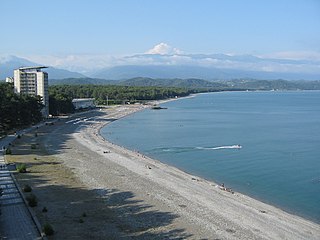
United Nations Security Council resolution 881, adopted unanimously on 4 November 1993, after reaffirming resolutions 849 (1993), 854 (1993), 858 (1993) and 876 (1993) concerning the Georgian–Abkhazian war, the Council extended the mandate of the United Nations Observer Mission in Georgia (UNOMIG) until 31 January 1994.

United Nations Security Council resolution 896, adopted unanimously on 31 January 1994, after reaffirming resolutions 849 (1993), 854 (1993), 858 (1993), 876 (1993), 881 (1993) and 892 (1993) on the Georgian–Abkhazian war and Resolution 868 (1993) concerning the safety of United Nations peacekeepers, the Council considered the possible establishment of peacekeeping force in Abkhazia and Georgia, and discussed the peace process.

United Nations Security Council resolution 906, adopted unanimously on 25 March 1994, after reaffirming resolutions 849 (1993), 854 (1993), 858 (1993), 876 (1993), 881 (1993), 892 (1993), 896 (1994) and 901 (1994), the council regretted that no agreement on a political settlement had been made between Abkhazia and Georgia, and extended the mandate of the United Nations Observer Mission in Georgia (UNOMIG) until 30 June 1994.

United Nations Security Council resolution 1096, adopted unanimously on 30 January 1997, after reaffirming all resolutions on Georgia, particularly Resolution 1065 (1996), the Council addressed the current situation extended the mandate of the United Nations Observer Mission in Georgia (UNOMIG) until 31 July 1997.

United Nations Security Council resolution 1124, adopted unanimously on 31 July 1997, after reaffirming all resolutions on Georgia, particularly Resolution 1096 (1997), the Council extended the mandate of the United Nations Observer Mission in Georgia (UNOMIG) until 31 January 1998.

United Nations Security Council resolution 1150, adopted unanimously on 30 January 1998, after reaffirming all resolutions on Georgia, particularly Resolution 1124 (1997), the Council extended the mandate of the United Nations Observer Mission in Georgia (UNOMIG) until 31 July 1998.

United Nations Security Council resolution 1187, adopted unanimously on 30 July 1998, after reaffirming all resolutions on Georgia, particularly Resolution 1150 (1998), the Council extended the mandate of the United Nations Observer Mission in Georgia (UNOMIG) until 31 January 1999, and discussed recent hostilities in the country.

United Nations Security Council resolution 1225, adopted unanimously on 28 January 1999, after reaffirming all resolutions on Georgia, particularly Resolution 1187 (1998), the Council extended the mandate of the United Nations Observer Mission in Georgia (UNOMIG) until 31 July 1999, and expressed an intention to review its mandate.

United Nations Security Council resolution 1255, adopted unanimously on 30 July 1999, after reaffirming all resolutions on Georgia, particularly Resolution 1225 (1999), the council extended the mandate of the United Nations Observer Mission in Georgia (UNOMIG) until 31 January 2000.

United Nations Security Council resolution 1311, adopted unanimously on 28 July 2000, after reaffirming all resolutions on Georgia, particularly resolutions 1287 (1999) and 1308 (2000), the Council extended the mandate of the United Nations Observer Mission in Georgia (UNOMIG) until 31 January 2001.

United Nations Security Council resolution 1339, adopted unanimously on 31 January 2001, after reaffirming all resolutions on Abkhazia and Georgia, particularly Resolution 1311 (2000), the Council extended the mandate of the United Nations Observer Mission in Georgia (UNOMIG) until 31 July 2001.

United Nations Security Council resolution 1364, adopted unanimously on 31 July 2001, after reaffirming all resolutions on Abkhazia and Georgia, particularly Resolution 1339 (2001), the Council extended the mandate of the United Nations Observer Mission in Georgia (UNOMIG) until 31 January 2002.
United Nations Security Council resolution 1393, adopted unanimously on 31 January 2002, after reaffirming all resolutions on Abkhazia and Georgia, particularly Resolution 1364 (2001), the Council extended the mandate of the United Nations Observer Mission in Georgia (UNOMIG) until 31 July 2002.

United Nations Security Council resolution 1427, adopted unanimously on 29 July 2002, after reaffirming all resolutions on Abkhazia and Georgia, particularly Resolution 1393 (2002), the Council extended the mandate of the United Nations Observer Mission in Georgia (UNOMIG) until 31 January 2003.
United Nations Security Council resolution 1462, adopted unanimously on 30 January 2003, after reaffirming all resolutions on Abkhazia and Georgia, particularly Resolution 1427 (2002), the council extended the mandate of the United Nations Observer Mission in Georgia (UNOMIG) until 31 July 2003.

United Nations Security Council resolution 1494, adopted unanimously on 30 July 2003, after reaffirming all resolutions on Abkhazia and Georgia, particularly Resolution 1462 (2003), the Council extended the mandate of the United Nations Observer Mission in Georgia (UNOMIG) until 31 January 2004 and endorsed the establishment of a police component.
United Nations Security Council resolution 1524, adopted unanimously on 30 January 2004, after reaffirming all resolutions on Abkhazia and Georgia, particularly Resolution 1494 (2003), the council extended the mandate of the United Nations Observer Mission in Georgia (UNOMIG) until 31 July 2004.
United Nations Security Council resolution 1554, adopted unanimously on 29 July 2004, after reaffirming all resolutions on Abkhazia and Georgia, particularly Resolution 1524 (2004), the council extended the mandate of the United Nations Observer Mission in Georgia (UNOMIG) until 31 January 2005.

United Nations Security Council resolution 1582, adopted unanimously on 28 January 2005, after reaffirming all resolutions on Abkhazia and Georgia, particularly Resolution 1554 (2004), the council extended the mandate of the United Nations Observer Mission in Georgia (UNOMIG) until 31 July 2005.

United Nations Security Council resolution 1615, adopted unanimously on 29 July 2005, after reaffirming all resolutions on Abkhazia and Georgia, particularly Resolution 1582 (2005), the council extended the mandate of the United Nations Observer Mission in Georgia (UNOMIG) until 31 January 2006.













